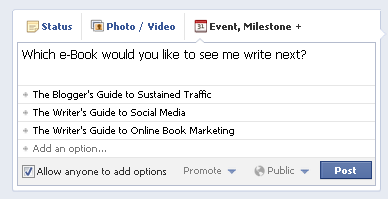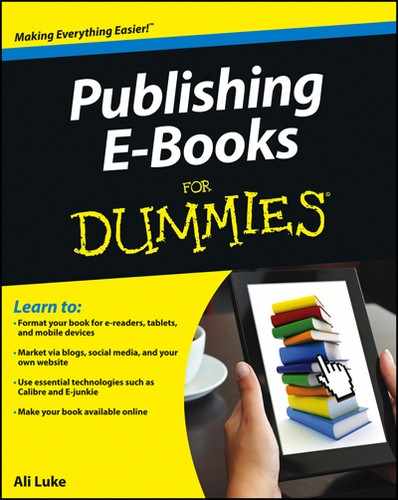Figure 16-4: Posting a link on Facebook.
Using Your Facebook Page to Engage with Your Readers
Enticing people to like your page is only the first step in engaging readers. After they’re on board, either encourage them to buy your first e-book, or (if they’ve already bought it) keep them engaged and interested so that they’re more likely to buy from you again.
If weeks go by and you don’t update your page, readers will forget about your e-book. If you update only with promotional messages (or with chatty messages that seem irrelevant to your readers), they’ll hide your updates from their Facebook News Feed (and they may Unlike your page, too).
You can easily post a link to a new blog post, which Facebook automatically formats to include the first few words of your post, plus an image from it. (If your post has several images, you get to select one.) You can see one of my blog post links in Figure 16-4, complete with a thumbnail version of my photo from New York City.

Asking questions to start a conversation
One simple way to engage your readers is to ask questions. If people rarely comment on your page updates, asking questions is a helpful way to make your page more active and attractive to new readers. (Even if lots of people have clicked the Like button on the page, a lack of comments may make it look deserted.) Ask open-ended questions that require more than a simple yes or no answer.
You don’t need to do anything special to ask a question. Simply type it into the Update Status box on your page.
Ask readers questions such as these:
![]() What did they learn from reading your e-book, or what did they enjoy most about it? Encouraging readers to think about the benefit of reading your e-book increases the likelihood that they’ll buy from you again. It also offers proof to potential readers that your e-book is useful or entertaining.
What did they learn from reading your e-book, or what did they enjoy most about it? Encouraging readers to think about the benefit of reading your e-book increases the likelihood that they’ll buy from you again. It also offers proof to potential readers that your e-book is useful or entertaining.
![]() What was their biggest struggle with a certain topic? If you write nonfiction, it’s a useful way to form ideas for new blog posts, freebies, or even your next e-book.
What was their biggest struggle with a certain topic? If you write nonfiction, it’s a useful way to form ideas for new blog posts, freebies, or even your next e-book.
![]() What is their favorite blog about a certain topic? Establish a good starting point on which bloggers you might want to write guest posts for and perhaps build a mutual working relationship. Encourage people to tell you why they like that blog so that you can see which elements to incorporate into your own blog or your next e-book.
What is their favorite blog about a certain topic? Establish a good starting point on which bloggers you might want to write guest posts for and perhaps build a mutual working relationship. Encourage people to tell you why they like that blog so that you can see which elements to incorporate into your own blog or your next e-book.
This can give you a good starting point on which bloggers you might want to write guest posts for and/or build a relationship with.
Creating polls for quick feedback
Though open-ended questions are useful for engagement, they aren’t always the perfect tools for the job. If you want a yes/no answer (or for the reader to choose a response from a list), a poll works well. You can use these responses to gather useful data or simply to encourage engagement.
To create a poll, click the Ask Question link in the updates area. (If you can’t see the option, click the item to the right. You should see the plus-sign [+] symbol next to it — and Questions will appear.) You can then type your poll question and enter the options for your readers to choose among. Figure 16-5 shows this process in action. As you can see, on my own Facebook page, I had to click the Event, Milestone + button to see the Questions option.
Figure 16-5: Creating a poll on Facebook.

On your poll page, explain that you’re starting to write your next e-book, and ask questions such as these:
![]() Which interests you more — growing prize-winning vegetables or reading money-saving gardening tips?
Which interests you more — growing prize-winning vegetables or reading money-saving gardening tips?
![]() What free bonus would you prefer?
What free bonus would you prefer?
![]() Who is your favorite character? (List your characters’ names.) Note that this question applies only if your e-book is a sequel to one that readers have already read.
Who is your favorite character? (List your characters’ names.) Note that this question applies only if your e-book is a sequel to one that readers have already read.
![]() Which type of chocolate do you like best — milk, dark, or white?
Which type of chocolate do you like best — milk, dark, or white?
Sharing news, updates, and interesting links
One key way to use Facebook is to share information with your audience. You can share news (“My latest e-book is out!”) or updates (“I’m writing Chapter 16 now — not far to go!”) as simple text or upload a photo or an image. The visual interest may be more likely to grab your readers’ attention.
When you share a piece of news, such as a new e-book release, encourage readers to let their friends know by adding “Please share!” to the end of your post, for example. Don’t do it too often, though, or it loses its impact.
Updates can be a useful way to let people know how a new project is going, but don’t overwhelm your audience with notes about your current word count. Phrase your updates carefully, too; you don’t want to give the impression that you dislike writing your e-book (even if, on some days, you tire of it). If your readers feel that you’re careless or indifferent, they may have concerns about the quality of the finished e-book.
Sharing interesting links with your Facebook audience is a helpful way to show that your knowledge of your genre or niche is current. For example, if you write fiction, you might share a link to the Amazon.com page for a novel that you’re reading — ideally, one that relates to your own work. If you write nonfiction, you might link to a blog post that covers ground similar to a chapter in your e-book.
Of course, you can also share links to your own e-book’s page (on your site or on Amazon) or to blog posts or other material you’ve written. Aim for a balance: Don’t promote only your own work, but equally, don’t be shy about linking to your own blog posts and e-books. Not every Facebook fan will necessarily realize that you have a blog or even an e-book, so remind them from time to time.

 Ideally, you should add new material to your Facebook page at least three times a week or even every day. Updating needn’t take long — and Facebook has plenty of ways for you to add interesting items, such as updates about your current e-book in progress or photos.
Ideally, you should add new material to your Facebook page at least three times a week or even every day. Updating needn’t take long — and Facebook has plenty of ways for you to add interesting items, such as updates about your current e-book in progress or photos.